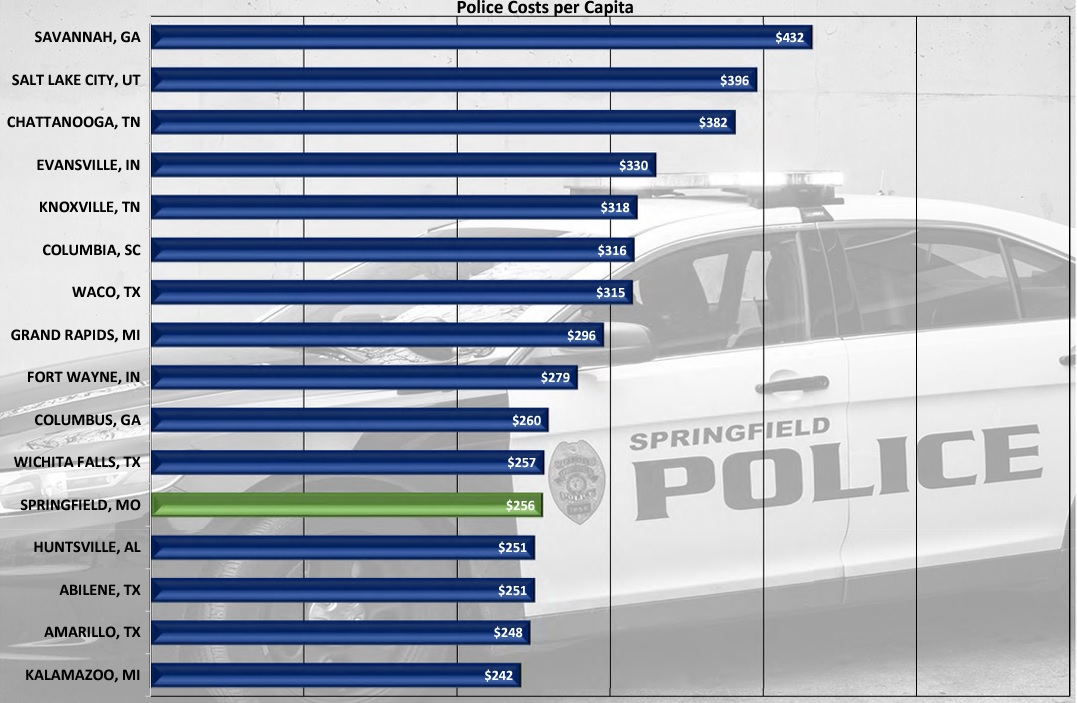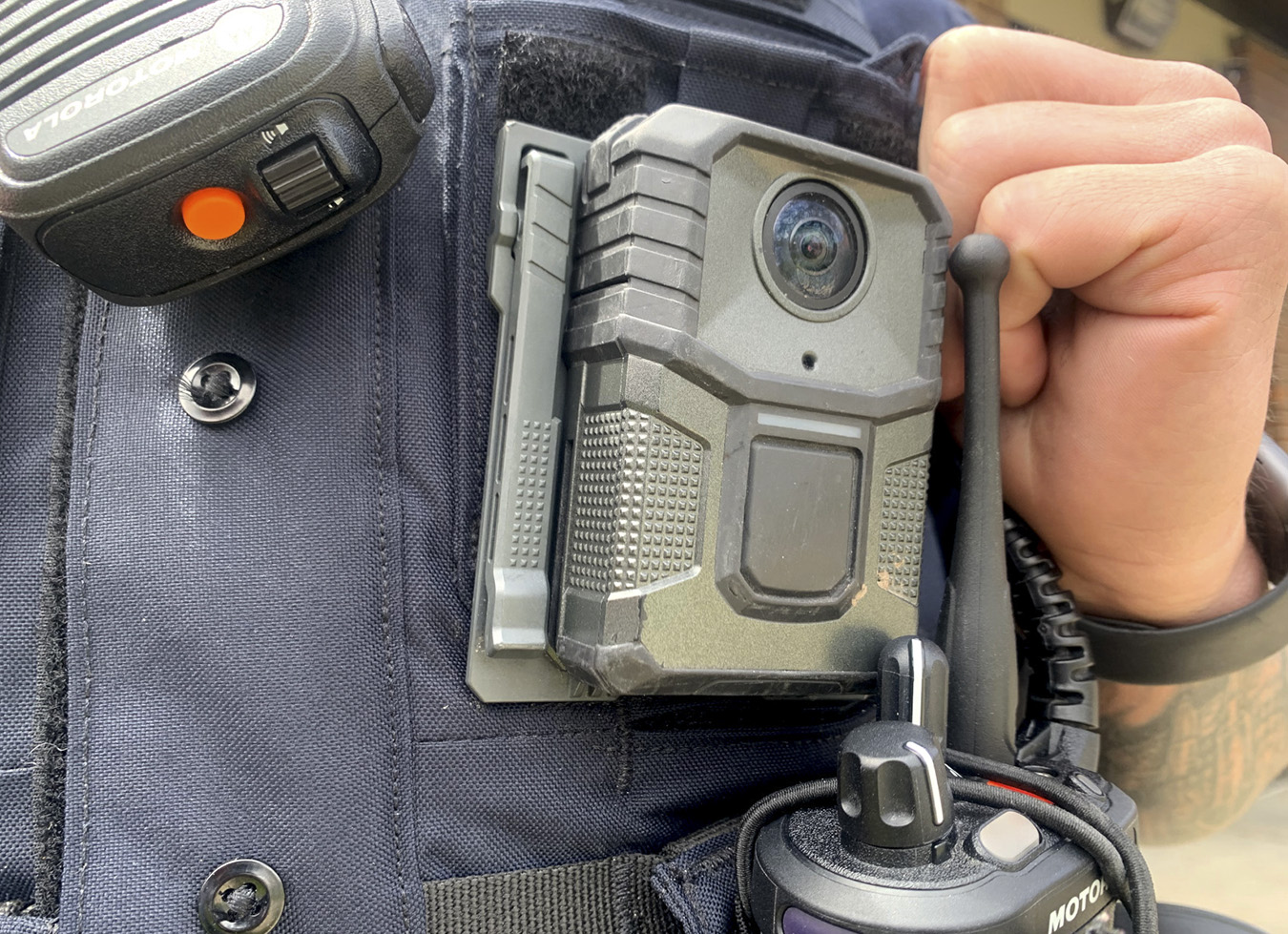If you’re sick of entitled drivers taking two parking spaces, paper dealer tags that expired two years ago and driving behavior better suited for a super speedway, you aren’t alone.
Traffic laws, and the Springfield Police Department’s efforts to enforce them, are the focal point of a budget amendment the Springfield City Council debated in the final days leading up to key police funding decisions. On June 13, the City Council will consider the final vote of adoption for the entire budget for the 2023 fiscal year, which begins July 1.
On May 31, the City Council voted 7-2 to enact a budget amendment that eliminates three patrol officer jobs from the 2023 budget, and replaces them with two civilian traffic safety officers and one civilian investigative specialist.
Springfield Police Chief Paul Williams oversees a staff of 387 people, 67 of whom are non-sworn civilian employees. One type of civilian employee called a traffic safety officer can write tickets to drivers who park illegally, block driveways, drive with expired license plates or commit other non-moving violations.
“They do a myriad of things that take the heat off of our patrol officers and our investigators,” Williams said. “They don’t have to go through a six-month academy and a three month training process. We’ll post that July 1, probably, and hopefully get the folks hired within 30 or 60 days.”
The Springfield Police Department has a budget for 368 uniformed and sworn officers, and presently employs 320.
With a staffing shortage of 48 police officers, Williams does not anticipate hiring enough uniformed police officers to make up his department’s staffing deficit in a single year. That doesn’t mean he wants to cut three patrol officers from the Springfield Police Department’s budget on a permanent basis.
“I did have a budget request in for three traffic safety officers and two investigative service specialists already, and then I was going to get one and one, and so it was just adding back what I originally requested,” Williams said. “I don’t want to lose those forever, so if we get back to where we’re going to hire, you’ll see me put in a budget request to get those three positions back.”

The Springfield Police Department has 24 officers in its training academy. They are among the 320 sworn officers accounted for in the police department budget. They are scheduled to finish their six months of academy training in July and then start three months of field training. The next academy class will start in September, and Williams hopes to have about 25 employees in the class.
“I have had a long-term goal of our sworn staff and non-sworn staff at a 4-to-1 ratio, so this will get us a little bit closer to that. You know, if you do round numbers, 400 and 100 is kind of our long-term goal,” Williams said.
The 2023 Springfield Police Department budget includes pay raises and benefit enhancements for employees. The department’s overall budget for 2023 is about $50.39 million, a year-to-year increase just shy of $5 million.
‘A battle they are not winning’
Councilman Craig Hosmer introduced the budget amendment to add salaries and benefits for three civilian employees and subtract three patrol officer salaries from the 2023 budget.
“All you have to do is look at the newspaper, look at what’s happening in the city of Springfield every day,” Hosmer said. “Police officers in the city of Springfield need help. They are under-sourced, they are under-personneled, and they’re fighting a battle that they are not winning.”
Councilman Mike Schilling felt the budget amendment was a small action against a problem long out of control.
“I think we’re just throwing some crumbs at things,” Schilling said. “I agree with the idea of getting more policing, but my opinion is — perception is that traffic in this town is a public menace much of the time.”
Schilling went on to describe drivers he observed and drivers his constituents observed, “speeding, reckless driving, racing in the nighttime at 1 in the morning, blasting around like yelling, screaming dinosaurs.”
“The noise, the screeching, the racing on our speedways, it was like they were piping in sound from the Indianapolis 500,” Schilling said.
City Manager Jason Gage read some primary job functions from a traffic safety officer’s official description. It included duties such as enforcing parking regulations in public parking lots and on city streets, issuing warnings and tickets for non-moving violations, and assisting in directing traffic for minor accidents and during special events. Hosmer said some of these duties can be delegated, freeing up police officers to handle larger crimes.
“What we’re learning is when you don’t have enough traffic service officers, you have commissioned officers doing that job,” Hosmer said.
Body-worn cameras

Hosmer introduced the amendment to take money that would have paid three commissioned patrol officers, and instead pay for two traffic safety officers and one non-commissioned investigative specialist. The civilian specialist's primary duty will be to organize and process requests for body-worn camera footage.
Hosmer’s budget amendment calls for any salary savings from the move to be put toward vehicles and equipment for traffic safety officers.
The Springfield Police Department purchased body-worn cameras for all of its police officers at the start of 2021. Every officer on patrol now wears a camera that can record their interactions, interviews and handling of evidence, even if the officer forgets to start recording data.
Camera footage is uploaded to a cloud-based storage system provided by the software vendor. Users in the Springfield Police Department are able to access stored files from computer terminals in the police department building, provided they have permission and are not subject to any restrictions.
Each piece of footage is stored for a specified amount of time in accordance with police department policy. Each file is categorized and indexed to prevent it from being lost or inadvertently deleted. Managing body-worn camera footage is a full-time job for two Springfield Police Department employees. It also affects the workloads of several others.
“We gave the authority for police officers in Springfield to wear body cameras, and yet, we don’t have the support staff — sufficient support staff to take care of all of the requests that they have for investigations, for police services and also for investigative services,” Hosmer said. “We have uniformed officers doing some of that work, which those uniformed officers should be out on the street doing the job of enforcing the laws in the city of Springfield.”
Council debates its level of involvement
The 7-2 vote on the budget amendment was not as much about the spirit of traffic enforcement or police funding, but more to do with procedure.
Hosmer, who was first elected to the Springfield City Council in 2013, noted what happens to funds that are not used to hire and pay police officers.
“We’ve always been short in the last nine years,” Hosmer said. “Every year we send more money that was supposed to be used for police officers — because we don’t hire police officers — every year we send that over to carryover.”
It costs approximately $65,000 per year to pay and insure a Springfield police officer, on the average. Hosmer said $3.2 million of the City of Springfield’s annual budget for law enforcement goes to the carryover funds and used for one-time expenses instead of wages for police.
General Councilman Richard Ollis, along with Zone 4 Councilman Matthew Simpson, cast one of the dissenting votes.
“My only issue with this is that I’m not sure that I want to as a councilperson be deciding staffing issues from the dais,” Ollis said. “I expect our department heads, our staff and our manager to do that, and so that would be my apprehension in moving forward with this issue.”
Zone 2 Councilman Abe McGull supported the amendment on the grounds that, based on the manpower shortage, it wouldn’t result in patrol officers being taken off of their beats.
“Even through the aggressive efforts to move people through the academy, we won’t reach our goal of being fully employed,” McGull said. “We won’t get to those numbers, so there are some monies in that budget that are sitting out there. Even though we budgeted for X-number of officers, we’re not going to reach that.”
Mayor Ken McClure asked Gage why the City Council’s intervention would be needed at this phase of the budgeting process.
“Does the chief have within his budget the ability to basically use his personal service appropriations for the level of staffing in a particular area as he deems best?” McClure asked Gage. “In other words, could he administratively make the decision that, ‘I’m going to need these traffic safety officers now, but I’ll give up two to three police officers.’ Can he do that administratively?”
“No, I don’t believe so, which is why this is in the form of an amendment in front of you,” Gage said.
All told, the 2023 budget for the City of Springfield has $444.9 million in estimated revenue and $444.9 million in estimated expenses. At $50.39 million, the Springfield Police Department is the third-most expensive of all city government departments, trailing the Department of Environmental Services ($69.75 million) and the Department of Public Works ($61.1 million).




